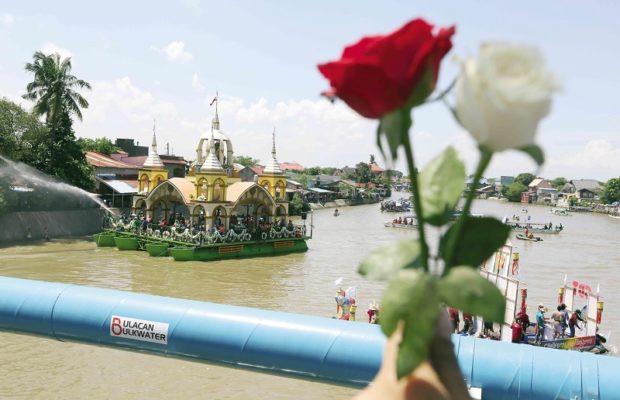Bocaue pagoda sails again; town moves on from tragedy

RIVER FEST Devotees on Sunday join the fluvial parade for the Holy Cross of Wawa along the Bocaue River in Bulacan province, the sixth celebration since its revival in 2014. The river procession was stopped for 21 years after the pagoda sank in 1993, killing 270 devotees. —NIÑO JESUS ORBETA
BOCAUE, Bulacan, Philippines — The pagoda of the Mahal na Krus sa Wawa (Holy Cross of Wawa) sailed on Sunday, a display of reassurance that the town and its people have already moved on from the 1993 tragedy that killed almost 300 devotees.
It was the sixth time that the multilevel structure, which was designed to hold the Holy Cross and its devotees, led a grand fluvial procession through the Bocaue River since the annual tradition was revived in 2014.
The town’s streets were adorned with colorful flags and “kundiman” songs were played as devotees prepared for the grand procession, held on the first Sunday of July.
Devotees forced their way through a throng of villagers waiting outside the St. Martin of Tours Parish Church where a Mass was held before the three-story high wooden pagoda left the docks for the parade.
Securing devotees
Col. Rizalino Andaya, Bocaue police chief, estimated the crowd to be more than 10,000 before noon.
He said only around 200 devotees were allowed to board the pagoda for the fluvial parade. Organizers required those on board to wear life vests and register on a manifest as a precaution.
As in the past five years, the pagoda was reinforced by metal braces to make it sturdy and ensure the safety of devotees.
Rodrigo Loreto, 57, a devotee from Pulilan town, joined the crowd who waited on a bridge so they could get a glimpse of the pagoda as it started sailing at about 10 a.m.
“We had a good view of it and we were happy to see it sail again,” Loreto told the Inquirer.
Unity, excitement
Estelita Bautista, 63, from Barangay Bambang here, said reviving the procession had also stirred excitement from people outside Bocaue.
During the fluvial parade, small motorized boats pulled the pagoda as it navigated the river.
Mayor Joni Villanueva-Tugna said the occasion united the town’s residents, despite belonging to different Christian denominations.
“We have different beliefs but our love for God and our town outweighs our differences,” Tugna said.
The devotion to the Holy Cross of Wawa, according to longtime Bocaue residents, began in the 1800s when a wooden cross was found in the river amid a strong current whipped up by a typhoon.
They said the cross came from the old church that had been razed by fire. The cross has since been kept in a riverside church in Barangay Bambang here.
On July 2, 1993, 270 devotees aboard the pagoda drowned when the craft tipped over due to excess weight.
Because of the tragedy, the cross-bearing pagoda never sailed again for 21 years until residents and businessmen revived the procession in 2014. —CARMELA REYES-ESTROPE